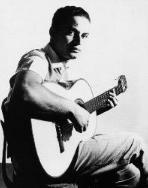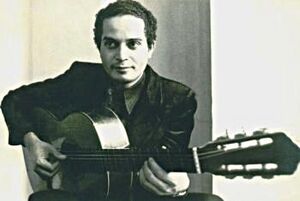Baden Powell (guitarist) facts for kids
Quick facts for kids
Baden Powell
|
|
|---|---|
 |
|
| Background information | |
| Birth name | Baden Powell de Aquino |
| Born | August 6, 1937 Varre-Sai, Rio de Janeiro, Brazil |
| Died | September 26, 2000 (aged 63) Rio de Janeiro |
| Genres | Brazilian jazz, bossa nova |
| Occupation(s) | Musician |
| Instruments | Guitar |
| Years active | 1950s–1990s |
Baden Powell de Aquino (born August 6, 1937 – died September 26, 2000) was a famous Brazilian guitarist. He was known professionally as Baden Powell. He mixed classic guitar playing with popular music styles. He also added a lively "swing" feel to his music.
Baden Powell played many types of music. These included bossa nova, samba, and Brazilian jazz. He performed on stage for most of his life. He wrote many guitar songs that are now very well-known. Some of these are Canto de Ossanha, Consolação, and Samba da Benção. In 1966, he released a very important album called Os Afro-sambas with Vinicius de Moraes. Many people think he was one of the best Brazilian guitar players ever.
Baden Powell's Life Story
Baden Powell de Aquino was born in Varre-Sai, a town in Rio de Janeiro, Brazil. His father was a big fan of Scouting. So, he named his son after Robert Baden-Powell, the founder of Scouting. When Baden Powell was just three months old, his family moved. They went to a suburb of Rio called São Cristóvão.
Their house was a popular spot for musicians. Many famous artists visited when he was growing up. He started guitar lessons in the 1940s. His teacher was Jayme Florence, a well-known choro guitarist. Baden Powell quickly showed he was a very talented young player. He won many talent shows before he was even a teenager. By age fifteen, he was playing music professionally. He played with singers and bands in different music styles. He loved swing and jazz music. But his main influences came from Brazilian guitar music.
In 1955, Powell played with the Steve Bernard Orchestra. This was at a nightclub in the Plaza Hotel in Rio. His amazing skill caught the eye of a jazz trio playing nearby. When Ed Lincoln needed a new trio, he asked Powell to join. They formed the Hotel Plaza Trio. Powell also brought in Luiz Marinho on bass. A singer named Claudette Soares joined them too. Powell, Lincoln, and their young musician friends often had jam sessions after hours. They became well-known in the growing Brazilian jazz scene.
Powell became more famous in 1959. He convinced Billy Blanco, a known singer and songwriter, to write lyrics for one of his songs. The song was called "Samba Triste." It quickly became very popular. Many artists have covered it. This includes Stan Getz and Charlie Byrd on their famous album Jazz Samba.
In 1962, Powell met the poet and diplomat Vinicius de Moraes. They started working together. This led to many classic Brazilian songs in the 1960s. At that time, bossa nova was the most popular music style. But Baden and Vinicius wanted to mix samba with Afro-Brazilian music. These included styles like candomblé, umbanda, and capoeira. In 1966, they released their album Os Afro-Sambas de Baden e Vinicius.
Powell also studied advanced music theory with Moacir Santos. He released music on Brazilian labels like Elenco Records and Forma. He also recorded for French label Barclay and German label MPS/Saba. One famous album was his 1966 Tristeza on Guitar. He was the main guitarist for Elenco. He also played for the singer Elis Regina's TV show O Fino da Bossa.
In 1968, Powell worked with poet Paulo César Pinheiro. They created more Afro-Brazilian inspired music. This was released in 1970 as Os Cantores da Lapinha.
Powell often visited and toured Europe in the 1960s. He moved to France permanently in 1968.
In the 1970s, he released more music in Europe and Brazil. In 1981, he performed for four weeks in Paris. He played guitar and sang on stage. Later, he faced some health challenges. He spent the 1980s mostly retired in France and Germany. In the 1990s, he and his family moved back to Brazil. There, he continued to record and perform. People in Brazil started to recognize his work more around that time.
He passed away due to illness on September 26, 2000, in Rio de Janeiro.
Baden Powell was the father of two musicians. His son Philippe Baden Powell de Aquino is a pianist. His other son, Louis Marcel Powell de Aquino, is a guitarist.
Baden Powell's Guitar Style
When Baden Powell was 19, he decided to stop playing the electric guitar. He chose to focus on the classical guitar for the rest of his career. He did record some albums using a steel-string acoustic guitar. But he mostly stuck to his main instrument as an adult.
He was interested in many different types of music. His music covered all the popular Brazilian styles of the 20th century. These included samba, bossa nova, and Afro-bahian ritual music. He also played frevo, choro, and North Eastern Sertão music. He even played European and Japanese lullabies. Like many musicians from the 1940s and 1950s, he was greatly influenced by jazz. He especially liked bebop and swing. He played Thelonious Monk's "Round Midnight" on two albums. He also played Jerome Kern's "All the Things You Are" three times.
His playing style showed a mix of jazz sounds and classical guitar technique. He had a very Brazilian way of using his right hand to keep the rhythm. When playing classical music by himself, he was very good at pieces by Tárrega and Bach. When he played with a group, he could quietly support singers. Or he could play lively street samba, making his guitar sound like another drum. He liked to use a special musical interval called the minor second. This helped him "bend" the sound. Because of his jazz background, he rarely bent the guitar string physically. Instead, he would play the minor second using an open string next to it.
Students of his style notice his choice of chord voicings. These often use extra notes on open strings to highlight parts of the music. Another thing to watch for is the many different rhythms he played with his right hand. These were always within the correct 2
4 samba beat. He also often put his "signature" on a song. This was a fast scale going down, followed by a slower arpeggio going up in the relative key. He also used vocalise and scat singing. He often sang along with the melody, especially when it was played on the lower strings of the guitar.
His musical influences included his first teacher, "Meira" (Jayme Florence). He was also influenced by Dilermando Reis and Garoto (Anibal Augusto Sardinha). He also mentioned being influenced by Les Paul, Django Reinhardt, and Jacques Loussier.
Baden Powell's Recordings
Baden Powell first appeared as a guitarist on some big band and samba recordings in the 1950s. He recorded his first solo album in 1959, which came out in 1961. His early albums included jazz songs, popular Brazilian music, and his own compositions. In 1962, he recorded with flutist Herbie Mann and drummer Jimmy Pratt. In 1963, he led small groups in Brazil and France.
French music labels like Barclay and Festival released many of his recordings. In Germany, MPS/Saba released his work. In Brazil, he recorded for Elenco Records, Forma, and the Brazilian part of Philips Records. After a few new releases in the 1980s, Powell went back to recording studios in Brazil. He continued to record in his final years. His later recordings often featured just his guitar, or his voice and guitar.
He also recorded with other artists:
- With Herbie Mann: Do the Bossa Nova with Herbie Mann (1962) and Latin Fever (1964).
- With Miltinho com o Sexteto Sideral: Um Novo Astro (1960).
Images for kids
See also
 In Spanish: Baden Powell (músico) para niños
In Spanish: Baden Powell (músico) para niños



